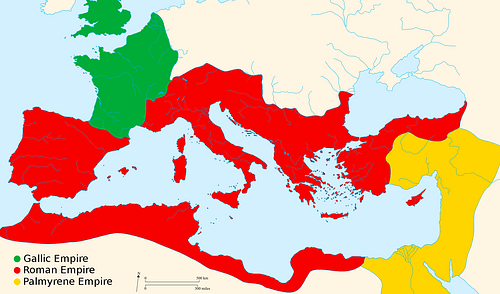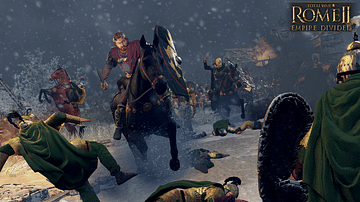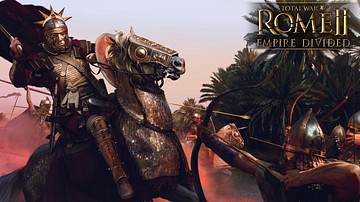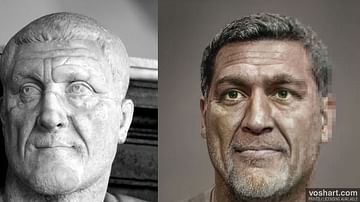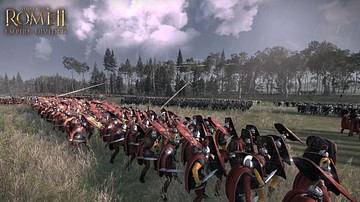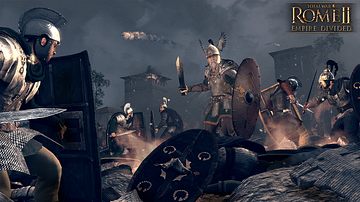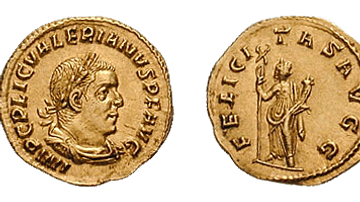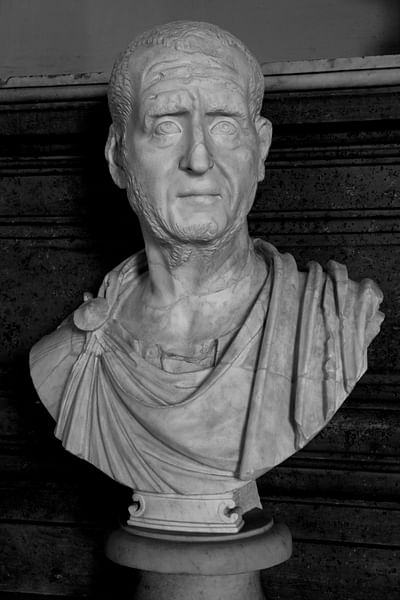
Decius was Roman emperor from 249 to 251 CE. In 249 CE Roman emperor Philip the Arab sent senator Decius to be the governor of the troubled provinces of Moesia and Pannonia. Roman legions under the ineffective command of the governor there were deserting to the invading Goths who were angry because Philip had cut indemnity payments. After repelling the Goths and restoring stability to the region, Decius's legions, already tiring of Philip's rule, declared him emperor. With the return of the deserting legions and the encouragement of his troops, Decius advanced towards Rome in September of 249 CE. Although some historians believe Decius was reluctant to battle Philip, the armies of the two emperors met at Beroea in Macedonia where Decius defeated and killed Philip. Shortly afterwards, Philip's young son and heir was killed at the Praetorian camp in Rome. Rome officially had a new emperor. He would be the first in a long line of emperors from the Balkans.
Early Life
Quintus Decius Valerinus was born around 190 CE to a large landowning family in the small village of Budalia located in the Balkan province of Pannonia. The young aspiring Decius married into a respectable Etruscan family - Herennia Cupressenia Etruscilla - they would have two sons, Herennius and Hestilianus. Unlike several of his predecessors - Macrinus, Maximinus and Philip - who had gained renown in the military, Decius had little, if any experience in the army, serving as a distinguished member of the Roman Senate and even as consul in 232 CE. From 235 to 238 CE he was the governor of Lower Germany and later Hispania Tarraconensis. During the reign of Philip, before he was sent to Moesia and Pannonia, he was the urban prefect of Rome. In an odd turn of events, when Philip offered to step down as emperor, it was Decius who stopped his resignation, saying it was unnecessary.
Decius As Emperor
After defeating Philip and consolidating his power in Rome, the emperor focused on a number of building projects including a repair of the aging Colosseum and the construction of the Baths of Decius. In 250 CE he returned to military service when he led forces to the Balkans to confront the resurging Goths who had crossed the Danube into the province of Thrace and attacked the city of Philippopolis. It was there that the Goths would ally themselves with the provincial governor Titus Julius Priscus. With the support of the Goths, Priscus wasted little time, declaring himself emperor. Unfortunately for Priscus, although the exact date in unknown, he was killed by his new allies before he could enjoy the benefits of the imperial office. In 251 CE while still fighting away from Rome, Decius received news of a second usurper to the throne, a senator, one Iulius Valens Licinianus. Unlike Priscus, he had some support in Rome both in the senate and withh the populace, but his rebellion and he would soon be put down by Publius Licinius Valerianus (a future emperor 253 - 260 CE) who had been appointed by Decius to attend to the administrative duties while he was gone.
Decius could not be bothered with these would-be emperors. His major concern was the leader of the Goths, Kniva. Despite being repelled by Decius' forces, the invading “barbarian” continued eastward where he was joined by the Carpi who had crossed into the Roman province of Dacia. With the hope of stopping Kniva, the emperor sent his oldest son Herennius to Moesia and Decius soon followed. Unfortunately, both Decius and his son (who had been appointed co-emperor) were unable to repel Kniva and his combined forces. They both fled to Oescus where they joined with the governor of Upper and Lower Moesia Trebonianus Gallus. Despite early success, Decius and his son (as well as most of their army) became entrapped in a swamp and died at the Battle of Abrittus. Decius was the first Roman emperor to die in battle against a foreign enemy. Trebonianus Gallus assumed the imperial title (251-253 CE) and quickly made peace with the Goths. Upon his return to Rome, he made Decius' youngest son his co-emperor but the boy would die shortly afterwards.
Unfortunately for Emperor Decius, he is remembered more for his persecution of the Christians than his military campaigns. Although Christians were not specifically named in any of the imperial edicts, it was evident for whom they were intended. Some historians speculate that his dislike of the Christians stemmed from Philip's less aggressive policies - the persistent rumor that Philip was a Christian. Decius declared that all citizens had to not only sacrifice to the Roman gods but also observe pagan rituals, something that both Jews and Christians, since the reign of Nero, had always refused to do. While Christians were not ordered to give up their faith, torture and execution were common for those who refused to demonstrate allegiance - even Pope Fabianus of Rome was not spared. This allegiance extended not only to the Roman gods but also to the emperor via the imperial cult. Decius had a fascination with many of those who had preceded him, and in an attempt to reaffirm their divinity, he issued coins to honor each of them. In addition, in order to associate himself with the Roman emperor Trajan, Decius even adopted the name of Trajanus. After the emperor's death, the persecutions ceased, only to be reborn under Emperor Diocletian fifty years later.

